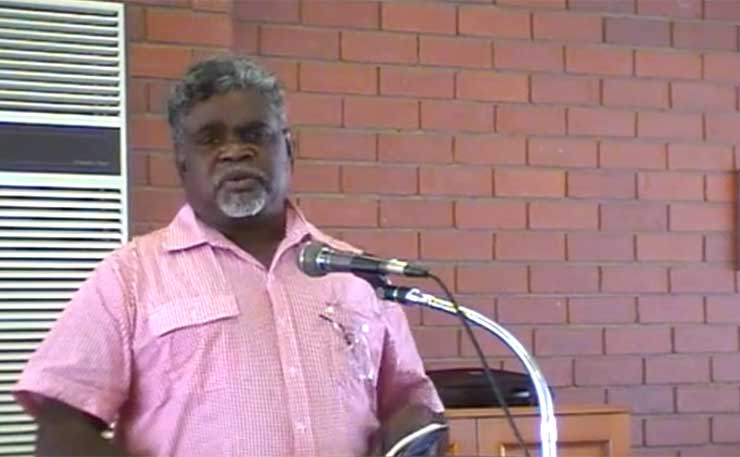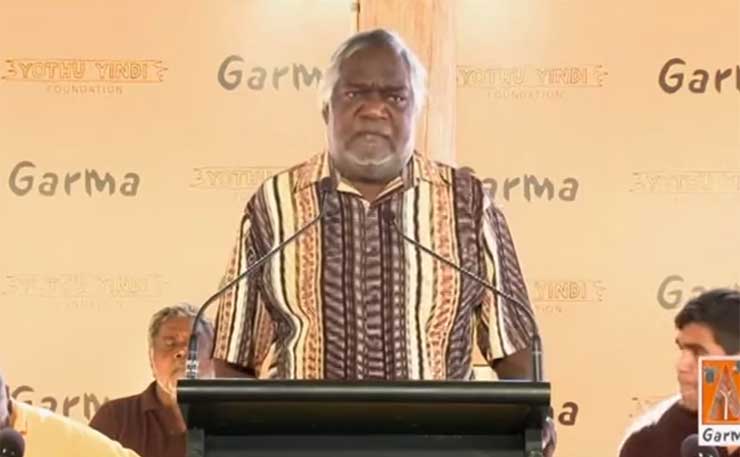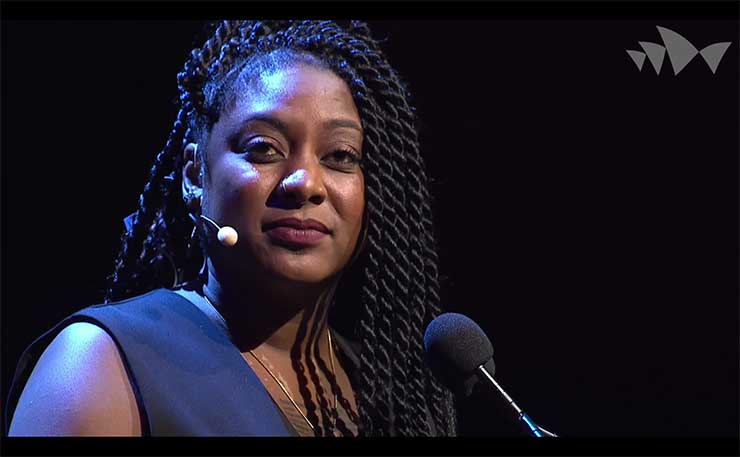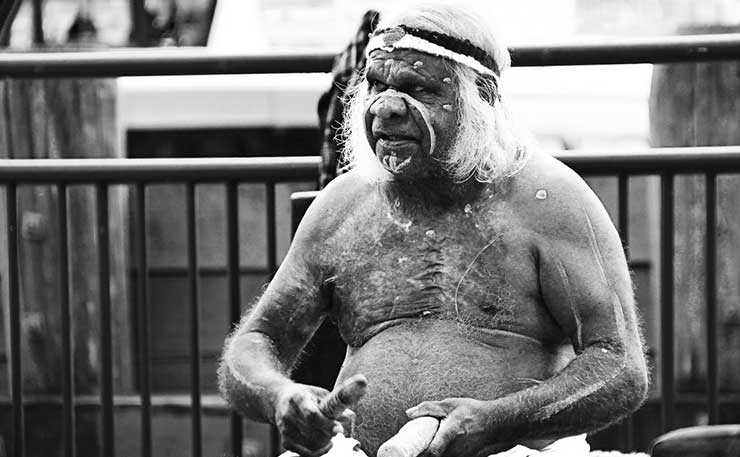A Yolngu man’s extraordinary win at the Northern Territory election is a significant milestone for the Treaty movement. Yet all the media can talk about is the ‘Indigenous’ Andrew Bolt.
In recent weeks it was declared that Yolngu man Yingiya Mark Guyula had won a stunning victory over Labor’s Lynne Walker at the Northern Territory election, running proudly on a Treaty platform.
At a similar time, notorious white man Andrew Bolt said some incoherent things on a bad television show about constitutional recognition.
Which have you heard more about?
There is, of course, an important role for cogent critiques of the ABC documentary Recognition: Yes or No, such as those provided by Amy McQuire and her almost namesake University of Newcastle academic Amy Maguire.
Amongst the show’s many ills were the provision of Bolt with yet another ignorance pedestal, the flood of ignorance promotion in the lead up to the show’s premiere, the erasure of legendary black voices of dissent, and the waste of water during the long hot shower we all needed afterwards to calm down.
Combine these specific problems with the press’s general neglect of vital Indigenous stories like Guyula’s victory in the Northern Territory, and you’ve got yourself a diabolical problem. Giving weight to white folks like Andrew Bolt and rendering black folks invisible is not exactly a first for the press, but it’s no less shameful for it.
To minimise succumbing to the very phenomenon I’m criticising, I promise not to mention Andrew freaking Bolt for the rest of the article – except maybe for a dig at the end.
Now to the actual news.

In the lead-up to the Northern Territory election, the independent candidate for the seat of Nhulunbuy, Yingiya Mark Guyula ,wrote, “If I win this seat, it will not only be a great victory for our Arnhem Land call for Treaty, but a strong statement adding to the call for sovereign rights for Indigenous people across the continent.”
The First Nations people of north-eastern Arnhem Land have made precisely that statement.
Held by the ALP since 1980, the seat was categorised as “Very Safe Labor” with a margin of 13.7 per cent. While Labor’s Lynne Walker won the majority non-Indigenous mining town of Nhulunbuy, Guyula won the vote in every single Yolngu community and was declared the overall winner by eight votes.
It’s a remarkable victory and not only for the size of the swing. In 2011, East Arnhem Land leaders founded the Yolngu Nations Assembly with the aim of working towards a Treaty for Arnhem Land. Guyula was chosen by the Assembly to run in the 2016 NT election on a Treaty platform.
If adopted, the platform would empower Indigenous communities of Arnhem Land with “law-making jurisdiction over its land and seas”, “policing and judicial powers within its boundaries”, “control of resources from regions land and seas”, “taking control of tax regimes”, and “being a ‘nation within a nation’, in line with the US ethos for Native American nations”.
The fact that all the Indigenous communities of this electorate voted for such a platform could hardly be a more explicit rebuke of the ongoing project of colonisation, nor a more obvious embrace of Treaty and decolonisation.
It’s by no means the first demand for sovereignty from the people of Arnhem Land.
In 1963, Yolngu elders presented the first petition to Federal Parliament for recognition of Yolngu land ownership prior to colonisation.
The 1988 Barunga Statement, presented to Prime Minister Bob Hawke by Gumatj clan leader Galarrwuy Yunupingu and Arrernte artist Mr Rubuntja, called on the Australian Government to “negotiate a Treaty recognising our prior ownership, continued occupation and sovereignty and affirming our human rights and freedom”.

This was followed by the 1998 Yirrkala petition presented to then Prime Minister John Howard, and the 2008 petition presented again by Yunupingu to Kevin Rudd.
The most recent petition sought full recognition of “our property, being the lands and waters of East Arnhem Land”, “Economic Independence”, and “control of our lives and responsibility for our children’s future”.
By 2009, after decades of being ignored by non-Indigenous governments, Galarrwuy Yunupingu was well and truly fed up.
He wrote this in The Monthly:
“I am seeing now that too much of the past is for nothing. I have walked the corridors of power; I have negotiated and cajoled and praised and begged prime ministers and ministers, travelled the world and been feted; I have opened the doors to men of power and prestige; I have had a place at the table of the best and the brightest in the Australian nation – and at times success has seemed so close, yet it always slips away. And behind me, in the world of my father, the Yolngu world is always under threat, being swallowed up by whitefellas.”
Following at least half a century of unheeded demands, seeking political representation in the Territory’s Parliament is the most recent step in the long Yolngu campaign for self-determination.
In the words of Guyula himself, “Governments have largely ignored these diplomatic gestures, so we decided to stop waiting and get started.”
His election victory is part of the broader decolonisation struggle of Indigenous Australians.
A decolonisation framework recognises the truth that colonisation is not confined to history; it’s an ongoing project of domination, control and assimilation perpetrated by non-Indigenous authorities.
The reality is that Aboriginal people live with the devastating impacts of colonisation every single day.
According to research in The Medical Journal of Australia, “The ongoing effects of colonisation are widely acknowledged as contributing to intergenerational trauma, disadvantage and poor health among Aboriginal and Torres Strait Islander peoples. Colonisation disrupted peoples’ connection to country, to culture, to communities and to families through policies that sought to control, stigmatise and intervene in people’s lives.”
Decolonisation is more than recognising colonisation as a lived reality. It’s also about emphasising the many ways Indigenous Australians have resisted oppression and fought for sovereign rights.
Co-founder of the Black Lives Matter movement Alicia Garza alluded to these twin aspects of decolonisation at a recent appearance at the Festival of Dangerous Ideas in Sydney.

“I don’t think we talk about colonisation any longer and that’s a problem. We talk about it as something that happened in the past, but it’s ever evolving. So if we deeply understand not just the history but the evolution of how colonisation still exists, then we’re able to chart a different path towards what we want to see instead.”
Aboriginal people have been charting a different path for over two centuries.
Professor Pat Dudgeon and Associate Professor Roz Walker articulate this in a paper called Decolonising Australian Psychology: Discourses, Strategies and Practice.
“Despite the devastating impacts since invasion, colonisation is also a global story about resistance and resilience and an ongoing struggle to claim equality and cultural recognition. Indigenous Australians have continually resisted colonial oppression through warfare and political activism to achieve self-determination and equal partnership.”
Guyula’s campaign is just the most recent example of this resistance and his demands are those which have echoed across Australia for generations.
“We want treaty. We want a partnership. We want a dialogue in decision-making. We want diplomatic talks with the government – the Yolngu government and the Balanda [non-Indigenous] government.”
In this light, Yingiya Mark Guyula’s victory in the seat of Nhulunbuy is not just an important milestone for the growing Treaty movement, but a significant moment in the long history of Indigenous campaigns for political, economic and cultural independence.
But yeah, let’s make sure we all stay tuned to the groundbreaking 19th century opinions of the ‘Indigenous inhabitant’ of this country with the loudest voice, Andrew Bolt.
Donate To New Matilda
New Matilda is a small, independent media outlet. We survive through reader contributions, and never losing a lawsuit. If you got something from this article, giving something back helps us to continue speaking truth to power. Every little bit counts.





